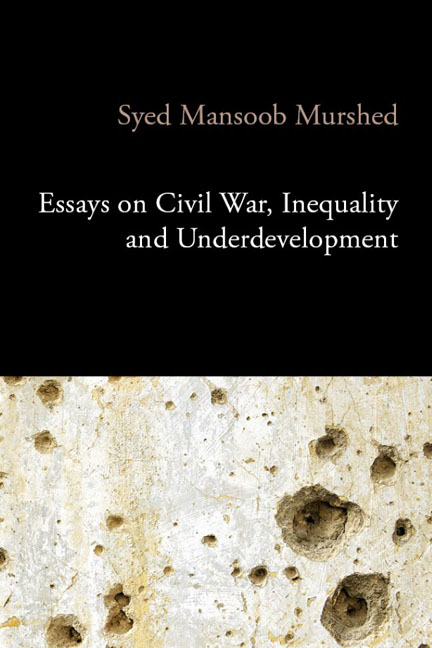Book contents
- Frontmatter
- Contents
- Preface
- Tables and figures
- 1 Conflict, civil war and underdevelopment
- 2 Revisiting the greed and grievance explanations for violent conflict
- 3 Greed, grievance and globalization
- 4 Economic dimensions of the liberal peace and its implications for conflict in developing countries
- 5 Enforcing peace agreements through commitment technologies
- 6 The conflict–growth nexus and the poverty of nations
- 7 Conflict and fiscal capacity
- 8 Does civil war hamper financial development?
- 9 The clash of civilizations and the interaction between fear and hatred
- 10 Transnational terrorism as a spillover of domestic disputes in other countries
- 11 Quantitative restrictions on the flow of narcotics: supply and demand restraints in a North–South macro-model
- 12 Spatial-horizontal inequality and the Maoist conflict in Nepal
- 13 Socioeconomic determinants of everyday violence in Indonesia: an empirical investigation of Javanese districts, 1994–2003
- 14 Not loving thy neighbour as thyself: trade, democracy and military expenditure explanations underlying India–Pakistan rivalry
- Acknowledgements
- References
- Index
8 - Does civil war hamper financial development?
Published online by Cambridge University Press: 09 January 2024
- Frontmatter
- Contents
- Preface
- Tables and figures
- 1 Conflict, civil war and underdevelopment
- 2 Revisiting the greed and grievance explanations for violent conflict
- 3 Greed, grievance and globalization
- 4 Economic dimensions of the liberal peace and its implications for conflict in developing countries
- 5 Enforcing peace agreements through commitment technologies
- 6 The conflict–growth nexus and the poverty of nations
- 7 Conflict and fiscal capacity
- 8 Does civil war hamper financial development?
- 9 The clash of civilizations and the interaction between fear and hatred
- 10 Transnational terrorism as a spillover of domestic disputes in other countries
- 11 Quantitative restrictions on the flow of narcotics: supply and demand restraints in a North–South macro-model
- 12 Spatial-horizontal inequality and the Maoist conflict in Nepal
- 13 Socioeconomic determinants of everyday violence in Indonesia: an empirical investigation of Javanese districts, 1994–2003
- 14 Not loving thy neighbour as thyself: trade, democracy and military expenditure explanations underlying India–Pakistan rivalry
- Acknowledgements
- References
- Index
Summary
Introduction
The contribution of well-functioning financial system towards economic growth has been highlighted in the development economics literature. Thinking about the importance of financial development can be traced back to the middle of the nineteenth century when Walter Bagehot (1878), founder of the Economist magazine, explained how capital markets efficiently allocated resources towards productive investment in England. Furthermore, seminal works by King and Levine (1993a, 1993b) and Levine et al. (2000) show that the level of financial development can be considered as a predictor of economic growth for a large number of developing economies. There is a positive relationship between financial development and per-capita income across countries.
Armed conflict, particularly in its common contemporary form of civil war, is gaining increasing attention from academics and policy makers as a major cause and consequence of development failure (see, e.g., Murshed 2010). Civil war involves the use of armed forces between at least two parties, at least one of whom is the state (Gleditsch et al. 2002: 618). On-going violent conflict's battle related deaths have been recorded by the Uppsala Conflict Data Program (UCDP) since 1946. A recent peak in the number of conflicts is observed in 1991 (52 armed conflicts in 38 countries). Since then, a decreasing pattern is noticeable in armed conflict occurrences, although the duration of armed conflict might not be declining. The recent updates for 2012 recorded the number of armed conflicts as 32 in 26 different locations around the world and also estimated battle-related death ranging from 37,175 to 60,260 (Themner & Wallensteen 2011). Moreover, the consequences of armed conflicts can be seen as not only a source of immense human suffering, but also causing diminution of the capital stock and productive capacity, hampering the growth of GDP (Collier 1999).
When we first envisage the effect of civil war on financial development, the matter becomes complex and is characterized by the paucity of previous analyses. Financial development is based upon a well-functioning financial system along with continuous financial innovation, progress in institutional and organizational quality, increasing competitiveness of markets with reduced transaction costs and the utilization of physical and human capital (Hartmann et al. 2007).
- Type
- Chapter
- Information
- Essays on Civil War, Inequality and Underdevelopment , pp. 129 - 150Publisher: Agenda PublishingPrint publication year: 2021



